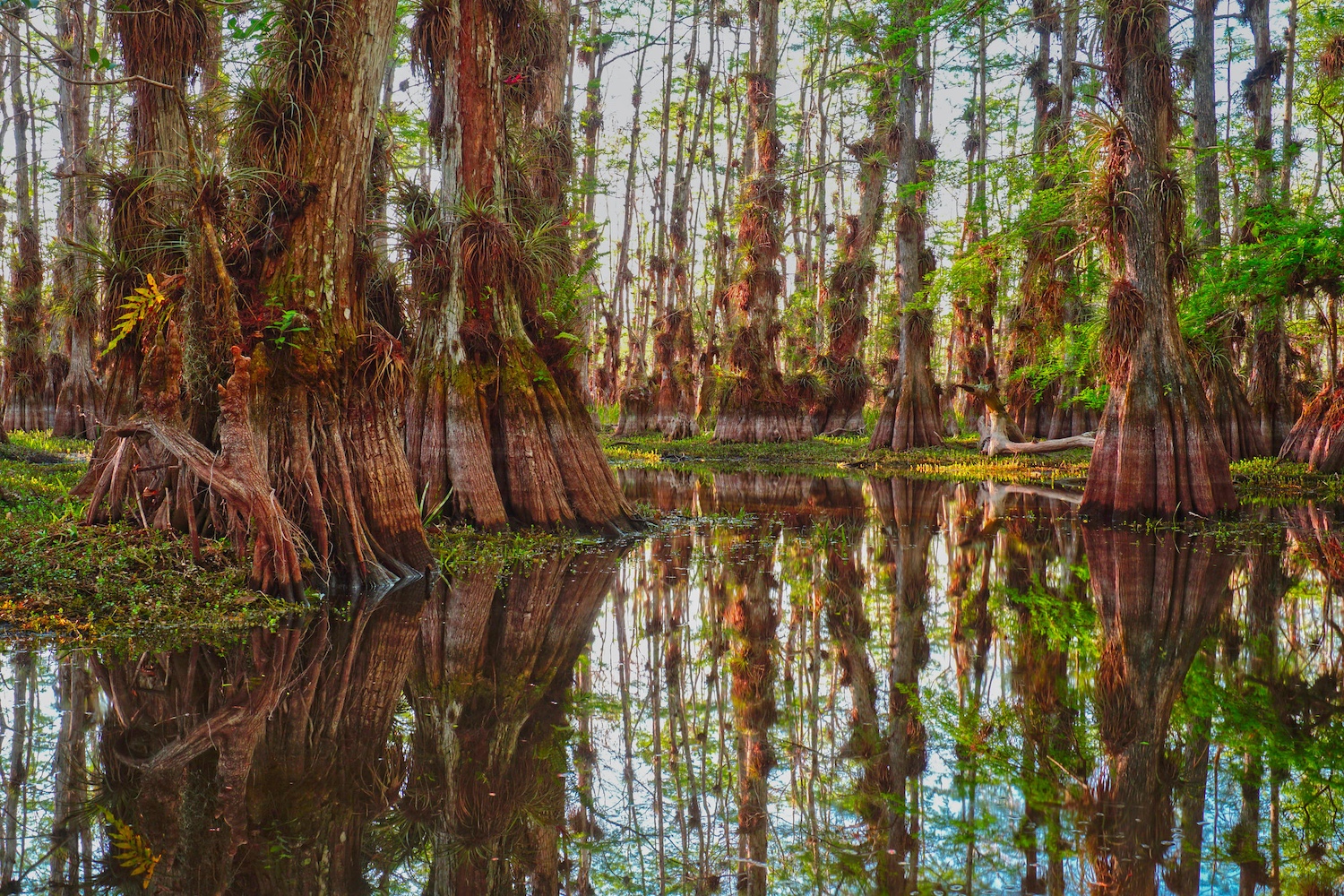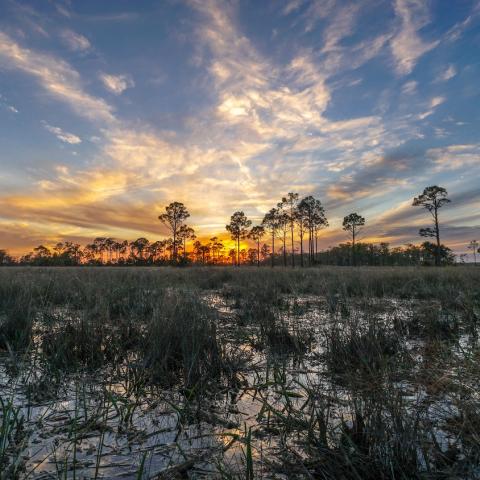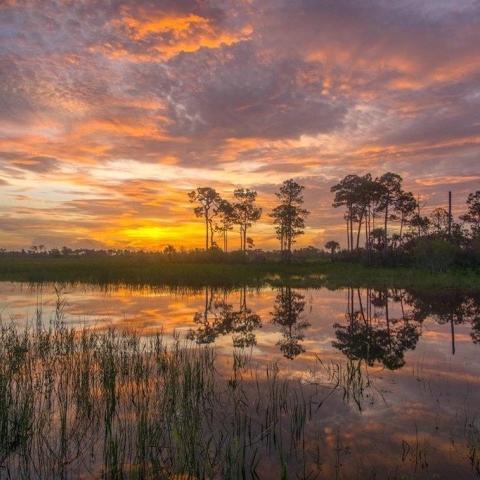Fifty years ago, when the federal government bought the Big Cypress Swamp and created the 729,000-acre Big Cypress National Preserve, it left a loophole that makes the word “preserve” somewhat misleading.
The National Park Service took charge of the land, which is a haven for some of Florida’s most endangered wildlife species, such as the Florida panther — but not the mineral rights under the land. Those are owned by the Collier Resources Company, which has from time to time dispatched oil companies to the preserve to look for black gold.
The feds have talked about acquiring Collier’s mineral rights since the 1990s, with appraisals of the value ranging anywhere from $5 million to more than $400 million. So far, those efforts have all failed.
Now three other parties have ridden to the Park Service’s rescue, nailing down a deal with Collier Resources that they say will halt any more drilling. Leading the charge is the Miccosukee Tribe, which lives in Everglades National Park.
“If successful, the acquisition would protect the ecosystem, the climate, tribal land rights and satisfy private interests,” the tribe’s chairman, Talbert Cypress, wrote in an op-ed for the Tampa Bay Times. “While modern society may require energy production, it no longer needs to be at the cost of our ecosystem and our planet.”
Working with the Miccosukee Tribe are a non-profit, WildLandscapes International, and an environmental consulting firm, Family Lands Remembered.

They began working together on the buyout more than two years ago, said David Houghton, director of WildLandscapes, a Tallahassee-based organization that aims “to conserve big wild places for wildlife and people.”
Houghton, a former president of the National Wildlife Refuge Association, said the head ecologist at Big Cypress encouraged him to talk to tribal officials about their interest in ending the oil exploration.
The tribe’s interest is understandable, said Ernie Cox of Family Lands Remembered, which is based in Jupiter on the state’s East Coast.
“These are their ancestral lands,” Cox said.
During the Indian Wars of the 1800s, most of the Miccosukees were forcibly relocated to the West. About 100 evaded capture by hiding in the unexplored depths of the Everglades, then a vast expanse that included the Big Cypress Swamp as well. They lived in small camps on the tree islands of the River of Grass, and today regard the trees as the repository of their ancestors' spirits.
In 1917, the state told the Indians they could stay in the Everglades forever.
When Congress created Everglades National Park, the National Park Service promised the Indians would "remain relatively undisturbed . . . in their own homes."
By the 1990s, the tribe's population neared 600 and they wanted more room in the park for more houses. When the park superintendent blocked their plans, they persuaded Congress to give them double the amount of property they'd had before. Today the tribe owns 80,587 acres of trust lands in four counties — Broward, Hendry, Highlands and Miami-Dade, and the tribal community sits on 667 acres along the northern boundary of Everglades National Park.
Tribal officials did not respond to requests for comment on their bid to purchase the mineral rights beneath Big Cypress.
Environmental Advocates
It’s far from the first time the tribe has taken aim at environmental preservation. Like the much larger and richer Seminole Tribe, which owns the Hard Rock chain, the Miccosukees have benefited from the vast sums produced by their casino.
However, they have used their gambling profits to hire experts and attorneys to battle for their ancestral home. The tribe has taken on a host of Goliaths — state and federal agencies and the sugar industry — filing lawsuit after lawsuit to fix the polluted, over drained, sometimes flooded Everglades.
In the 1990s, one top Everglades activist said the tribe was achieving more for the environment than many environmental groups.

Though Burnett Oil's agreement with the Park Service called for restoration work on a daily basis, that didn't always happen. This photo was taken in April 2018/Natural Resources Defense Council
By 2020, when Houghton first met with Miccosukee officials, Collier Resources had for the past two years unleashed a Texas company, Burnett Oil, to search for oil deposits. The oil company used a massive, 33-ton machine that sends sound waves into the ground to determine how much oil might be under 110 square miles of the preserve.
Burnett left obvious signs of environmental damage: Muddy tire ruts 2 feet deep and 15 inches wide that filled with water as if they were boating channels. Dwarf cypress trees that had been cut down or driven over. Earthen interruptions of the flow of water across a landscape that feeds into the Everglades’ famed River of Grass. All told, Burnett gouged 100 miles of trails into the swamp, which federal officials required them to clean up. Conservation advocates take exception to the restoration that's been done to date.
Meanwhile, there are already 11 producing wells within Big Cypress, but they’re not exactly gushers. According to the Miami Herald, those 11 wells have collectively produced a mere 36 million barrels of oil since they were first drilled in the 1970s.
Closing In On A Deal
When the Miccosukee tribal officials hired Houghton, he arranged to meet with Collier officials. They are notoriously tight-lipped about their plans for the vast swath of Florida land inherited from pioneering real estate mogul Barron Collier, who brought the area its first telephone service, first railroad, first newspapers, and first bus company — not to mention building the Tamiami Trail, the first road to cut across the Everglades. Even the county where the Big Cypress is located bears his name.
When Houghton first met with Collier officials to talk about acquisition of their mineral rights, they wanted his help with a different parcel first. Houghton and Cox agreed to the effort, which did not involve the tribe.
By last fall, they had worked out a deal with Florida officials for the state to spend $29.5 million to acquire more than 11,000 undeveloped acres that are home to black bears, Florida panthers, and 37 other federally listed species. This was the first time the Collier company sold both its land and its mineral rights to a government agency.
Meanwhile, Houghton and Cox continued negotiating with Collier officials about what the tribe wanted in Big Cypress, too. In January, the tribe announced they had worked out a deal that company officials found acceptable.
The agreement covers the mineral rights to 420,000 acres, including the places where Burnett Oil hunted for new wells. It does not cover the 11 existing wells, but Miccosukee officials have said they plan to nail that down next. No one has mentioned the dollar amount publicly.
Now the work is up to the tedious part, Houghton said: title searches to verify the Collier company owns the land free and clear, appraisals for the value of the mineral rights, and other necessary steps in the due diligence for federal purchase. Ultimately, congressional approval will be required.
Cox said he’s hopeful that the money will come out of the Land and Water Conservation Fund, a pool of cash made up of the federal government’s cut from oil companies drilling offshore and on federal property. Houghton said he believes it will all be settled within a couple of months.
However, the whole thing could still fall apart. In 2003 the Department of the Interior signed an agreement to buy Collier’s rights for $120 million, but that deal fell through. A subsequent inspector general’s report found that Collier had used its political clout to bully department officials into a deal it described as “fundamentally flawed,” because the true value at the time was far less than $120 million. The investigation also found notes from Interior officials suggesting Collier didn’t really want to drill for oil, but just wanted to get paid.






 Support Essential Coverage of Essential Places
Support Essential Coverage of Essential Places






